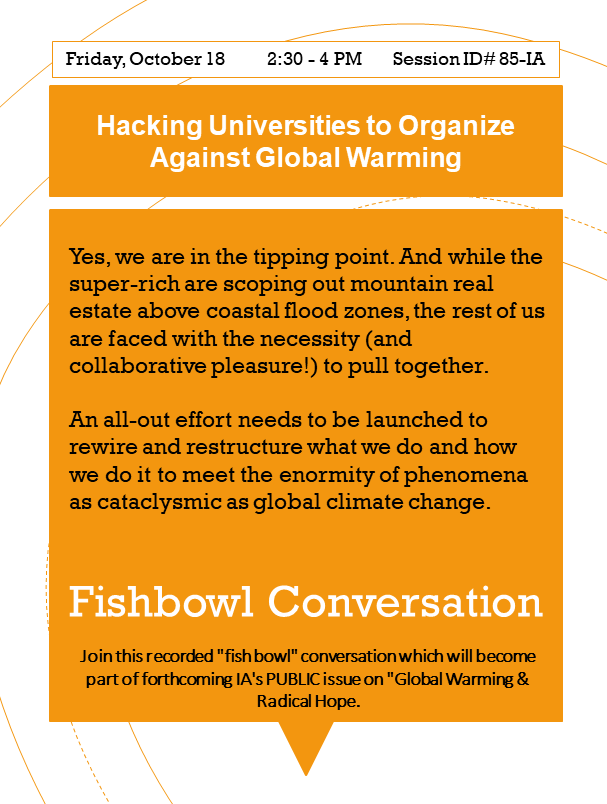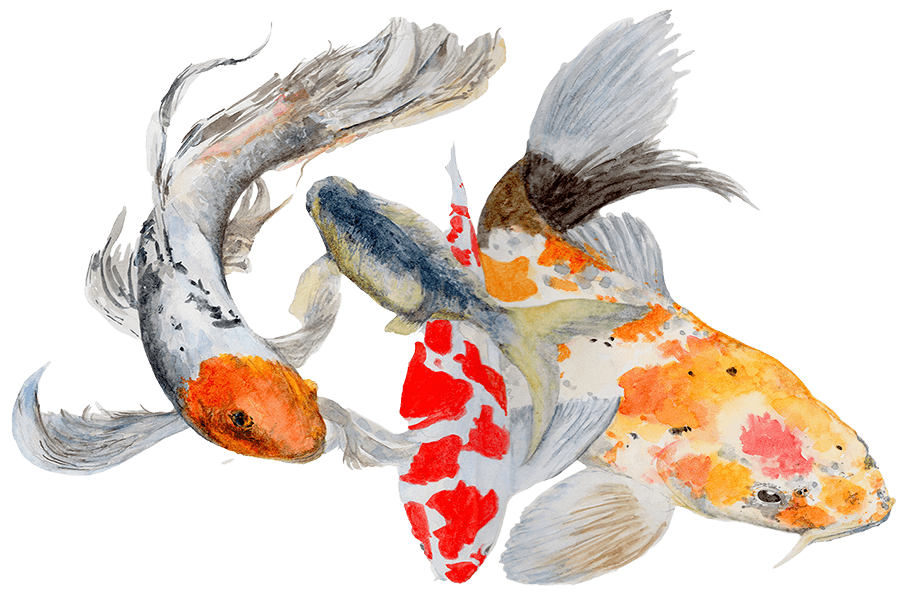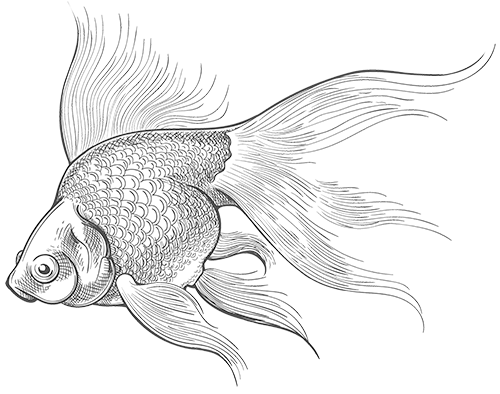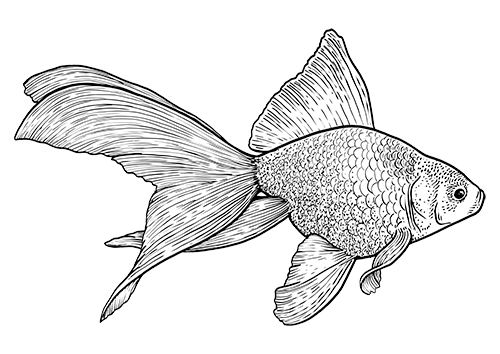A Conversation on the University
Abstract
Contributions to this discussion were made by participants in a live conversation held at the 2019 Imagining America National Gathering in Albuquerque, New Mexico, on October 18th, 2019.

A Fishbowl Conversation?
We embraced the "fishbowl" conversation format to engage a lively and interactive conversation among attendees. In a fishbowl, chairs for all participants (because everyone is a participant!) are arranged in concentric circles, with a small set of chairs in the center, kept empty at first. After the topic is introduced, the audience is openly invited to fill all but one of the chairs in the center. While only those in the center circle are actively participating in the dialog, at any time, any member of the audience may occupy the empty chair, and upon doing, someone in the center must voluntarily leave the center and return to the audience.
What appears below in audio form and as a complete transcript is the entirety of our conversation.
Click here for moderator Jack Tchen's Afterthoughts
Playing the audio will automatically scroll the transcript to the active speaker. If you wish to review the written transcript on you own, pause the audio so that it will no longer automatically scroll.
Jack Tchen 00:00 Great. So who would like to begin? Okay. So whoever's holding the talking stick is the one who is speaking.
Katerie Gladdys 00:10 And so I'm just going to talk about what's going on at my university about climate change.
Jack Tchen 00:14 Well, actually, let's go around to the four of you and identify yourselves and maybe identify one compelling issue that you're grappling with terms of this question.
Katerie Gladdys 00:24 Okay. And it's on, correct. Yes, I see it going. Okay, so, my name is Katerie Gladdys. I teach at University of Florida. Florida is a state, a peninsular state that's surrounded on three sides by water. I think one of, and I teach in the art department and the art and technology area. I think, one of the, I guess the larger university discussions that is going on, I don't know if it's a so-called climate change, but rising sea level, there's a lot of conversation about rising sea level. You know, already there are places in Florida, let's say, Miami. You know, its fiber optics, underground fiber optic system is, you know, under water, they're having to, to move it in or put it above ground. Also, too a lot of our water supply, you know, we're living on limestone. We have a limited supply of fresh water, and already with the way that the sea is rising, salt water, salt water incursion is happening. So, people are starting to think about there's a desalinization plant in Tampa. So, we're really beginning to think of some of those effects of global warming.
Tanya Kane-Parry 01:35 Tanya Kane-Perry, Cal State LA. So, water, right, that's the ongoing issue in California. If you don't know, watch Chinatown, it's true. But also, I have been, so water is the ongoing issue and that's never going to stop. That's always going to be the issue. Some years we have water, some years we don't have water. The water is being stolen. It's being misused. The majority of the water is going into the agrobusiness. Agrobusiness is a huge issue. You can't look at California and the economy and, and global changing without looking at agrobusiness and the use of water and land and deforestation. They are so linked. So yeah, California is known for like great vegan food now, right, but there's also like, a real responsibility in that. Secondly, is, since last December, I've been volunteering through Al Otro Lado at the border in Tijuana, with the refugees. Most of these are due to climate change. That is where the big migration has started from, same as the Syrian migration that we saw in Europe. So, we're looking at national security. We're looking at mass, massive migrations that we have not seen in our lifetimes, and we're looking at limited resources. As the Arctic is melting, as the glaciers in the Andes are losing water. And I'm sitting in a land with no water.
Betsy Bolton 03:13 I'm Betsy Bolton and I teach at Swarthmore College. And I'm actually hearing the question a little differently. So, I'm going to just speak to institutionally, I have two questions. One is what is our leverage point as faculty members for trying to change the, or engage with, the crisis? And, as I think about that, I feel as though I have failed personally to move my fellow faculty members, so I'm looking for help on how to do that. And, but the alumni keep telling me, look, you have a small campus community, but you have a much larger alumni community and that's where your point of leverage is, so focus there. So that's the first thing. The second thing is about the connection between decolonizing the university and climate justice. And I feel as though on our campus, we have different communities committed passionately to those two conversations, not seeing the connections and not collaborating well, and I really, really want to find ways to bring those communities together effectively.
Kori Suzuki 04:26 I'm Kori, I'm a junior at Macalester College in St. Paul, Minnesota. And I think one of the biggest discussions that I see happening at the college is sustainability versus stronger action. I think, especially in universities, and in broader discussions as well, sustainability is a very, very prominent discourse. But I think at my school specifically, there are a lot of questions about whether or not it's the right way to do things. We have all these goals: carbon neutral by 2025, zero waste by 2030. And these, these achievements are important, absolutely, but they're also somewhat insular. I mean, we're talking about one university that's also invested in fossil fuels. So, maybe there's a little bit of a discrepancy there. But, these are also broader discussions that are happening on an international level. I mean, we're talking about the UN sustainability goals and these, these achievements are not accessible to all communities. These are not things that everybody can hope to achieve, and that kind of change is what is needed to address climate change. It can't just be universities, it can't just be wealthy communities that have accessibility or that are able to access these resources. It has to be changes to systems that, that affect everybody.
Jack Tchen 05:57 If you pick up on the first.
Tanya Kane-Parry 06:02 I want to respond back and I thank you for bringing back the word decolonization. I don't know how to talk about decolonization without talking about capitalism, or colonization and capitalism, about consumerism, about taking away from others, and, and making a profit. And, so when I look at thinking about decolonization at the university, as an institution, thinking about decolonization in terms of the urban landscape that I live in, thinking about colonization in terms of the resources and how those are being misused. My, my question is, as an individual, so much in our current conversation about climate change is, is what is each person can do, which negates the larger issues and the systems of consumerism, of waste, of global heat, of heat, global heating, and so it's very convenient to make it all about me, and how I use less plastic and I bring my bags, and I drive my electric car, but that absolves us from taking on the bigger picture. And again, can't do it alone, right? I don't have an answer for that. But is there, is there thoughts or suggestions? And it doesn't have to be just from me, anybody, how to engage the campus community, the place I spend more time than I should, in addressing that, that stops making about my personal responsibility, and what can we do both as an institution and locally in terms of the systems? Yeah.
Katerie Gladdys 07:45 So, I guess I wanted to kind of connect what you said, and what you said. And I guess I'm wondering, I'm thrilled, how brave you are as a student to come and view the fishbowl, thank you so much. But I started to think like, as a, the thing that we do is teach, I mean, that's a, that's a big thing that we do. And I, in some ways, like, that's like the first step, I guess away from being, you know, like individual, like, I bring my bags or I drive a particular kind of car. And so, I guess I wanted to ask you, like, you know, how do, how do you get taught about climate change? Or when does climate change come up? You know, at your institution does it come up in classes? Does it come up with an activism among students? Or, yeah, how does, how, how? Because, you know, in many ways, you're going to be the people that have to either deal with the consequences of climate change, you know, make, come up with the solutions. I mean, everyone, all of us, need to come up with the solutions, but you are kind of on the forefront of that. And I guess, like, how are you exposed to that within an institutional setting?
Kori Suzuki 08:51 I think that's a really interesting question. And I'm not sure I can speak for all students, but this in my, in my experience at my school, I think a lot of us are very aware that, of the gravity of the situation. And I don't think this is necessarily just coming from faculty and coming from people who are teaching us about this, but I think a lot of, a lot of students are just seeing this, seeing these kinds of conversations in their everyday lives, and people that they talk to, and in conversations with friends. I think it's becoming a really big part of the campus conversation. And I'm sorry, I don't know if I'm totally…
Katerie Gladdys 09:32 I guess is there a way that the people here that are teaching or as faculty, it has been faculty, your school that has engaged you and other students on this topic, and how have they done it? Or like, you know, how would you want to be, how would you want to have that discussion? So, it's, it's not the worry, you know, the worrisome, you know, conversation that, that one has with their colleagues. Do you know what I'm saying?
Kori Suzuki 09:56 Yeah.
Katerie Gladdys 09:56 How does it become sort of institutionally within like a teaching environment, talked about it. Anybody can be talking about that?
Betsy Bolton 10:04 So, this is, this is kind of a, this is a story from Swarthmore, that is both an answer and a non-answer to that question. As you may or may not know, the divestment movement started at Swarthmore, and it started because Professor George Lakey took a group of students down to coal country, to mountaintop removal country, over spring break, and those students saw what frontline communities were dealing with and came back and said, "We need to respond to that. What can we do, given our positionality?" And their answer was for Swarthmore to divest. Swarthmore has still not divested, but we're trillions of dollars of divestment later. Right, so there's both the sense of what can an individual faculty member do in terms of high-impact learning, and then where does the institution refuse to follow, and then those students. So, they that, that movement persisted, in troubled ways, in some difficult ways on campus. But recently, in the past sort of three years, has become very engaged with the Sunrise Movement. And so, so that's a developmental story about hacking a small, private, rich college in a broader way. I don't think it answers the questions I have, but it's a story.
Sarah Singh 11:38 Hi, my name is Sarah. I am a graduate student at Tulane in their history department, and I'm an alumna of NYU, and was on their fossil fuel divestment campaign. And think that, I think that, the question of divestment as a tactic has come up in student organizing at NYU, at across the board, in terms of universities nationally, because of the wall it runs up against, and the realization, I think, and it's the realization of the power that is held on boards of trustees and these types of entities that control the endowment of universities. So that is one thing. The legitimacy or the tactical nature of divestment, and we, divest has become decarbonize and the, the intervention that that kind of mitigation effort makes, as opposed to divestment, is also in conversation like what would this tipping point makes most sense to be organizing around. But, to a point that was brought up earlier of what can be done and, as you pointed out, [aside] can you remind me of your name [end aside] as you just pointed out, but see like this is, I saw it and joining and organizing with this campaign as a hack, if we will, to be in this between faculty and students and just people who are in the mind of academia and learning together and like radically sharing something and space, it all kind of coalesced around how capital is quietly put places and hidden under the name of the university that is invested literally in the destruction of people in places but has, it's also invested in its public image being maintained, trying to get at that, and finding community in the university around that, was something really powerful. And that was my student organizing experience and contribution to this.
Tanya Kane-Parry 14:02 I want to, I want to respond. Thank you so much. I also went to NYU, a little earlier. So, I want to give you a great example of the, that kind of duality that you just brought up. So, we have these really high-tech recycling bins everywhere. They're the kind that like flash lights and they look like they're solar operated. They look really awesome. We also just got rid of straws in the, right, in the whole like city of LA, no straws, awesome. Okay, great, so late at night, sometimes, I'm there on campus, and I see the janitors, right? And we watch them take everything out of the recycling and throw it in the trash. And I said, “Why, why are you doing that?” They said, “Do you see any recycling facilities around this campus? Where are we supposed to put this stuff? University knows there's nothing here.” I was like, “Oh, so this just looks nice?” They're like, “Yeah, looks really great.” So, I take all my recycling home, right. I have a bought bag in my office, right, doing my personal bit. And every once in a while, I watch people, you know, shredding and putting it in the right kind of bag and they put it in, I'm like, you know, it's just going into landfills. And they’re like, what are you talking about? Like, there's no recycling on this campus. And yet, the campus held a notice recently that they were going to do a colloquium on becoming more green. And I was like, are you joking? Like, let's talk about the recycling bins. So, there's this duality of image, right? Oh, we're gonna keep the [rooms warmer]. We're not gonna use so much AC, right. So, everyone get ready, right. We also, you know, because of the wildfires right now, we're having power outages all the time, right. So again, it's falling on individual responsibility and the complete duality and hiding and contradiction and hypocrisy that is going on at the institution.
Kori Suzuki 16:11 I have a slightly similar, related story. I'm part of the campus media. I'm a journalism major. So, I'm not directly involved in a divestment movement or any student activism, but I'm working on a project right now about climate change for the newspaper podcast. And we talked to two different perspectives to kind of get a handle on this issue. One of them was the school sustainability manager, who we talked to her and we asked her what the, the best things were that we could do personally. And she said, "Think about your food. Think about where you get it, think about sourcing it locally, and not eating as much meat and think about your transportation, think about not flying as much, think about not driving places, public transportation," and then we talked to a professor who is the former Environmental Studies department chair and we asked her the same question and she said, "Activism," she said, "Speaking out and talking about these things that, that these little changes are significant changes in our personal behavior." But we're talking about sacrifices. We're talking about people who have the ability to make sacrifices, and that that is not going to be an effective way to combat climate change. And one really great point that I think she made that made me think really differently about my role as a student was that especially on campus community, she said that "students in a lot of cases have the most power, have the best ability to stand up to the administration and to force them to make changes." And I mean, she talked about how faculty, how faculty that try opposed, opposing universities are often shut down, are often threatened. And staff similarly have even less of ability to, to make those kinds of changes. And then, it was that we actually talked to her at a student protest. It was a sit in by our own divestment movement at a meeting of the Board of Trustees. And that meeting ended up being an achievement for our divestment movement. It ended up being an acknowledgement by the board that they needed to move away from the investments in the fossil fuel industry. And, for the first time in the history of our divestment movement, the board decided to not renew contracts in, in those industries, with certain caveats, which the student org is still working out with them and has agreed to continue to try and press towards eliminating those caveats, but it was definitely a big movement. And I think that really underscored for me what, what she said, that student movements have a lot of power in what universities do, it just it, just takes a lot of students in a lot of voices.
Tanya Kane-Parry 19:07 I have a question for everyone in this room. Why do boards of universities, boards of trustees, why aren't they also worried about their children and their grandchildren? Why are they able to sacrifice their own children and grandchildren for the immediate financial needs?
Betsy Bolton 19:34 Who can answer that, right? But my provisional answers are twofold. One is that the richest people believe they can buy their way out of climate change. They believe they can buy themselves adequate protections, that the food is not going to vanish, that the, you know, that they don't believe in collapse, so they don't believe in collapse. That's one answer. And then the other answer is my answer to the question of why are, why is this room not full? Why is, why is this not the topic that is dominating this entire meeting? And that is because we can't bear to look at this. And they so, they are not alone, right? None of us can bear to look at this for very long. And so, Jack, your term of radical hope, you know, I have so many conversations about hope but let's, you know, forget about hope. Hope is really not helpful to us right now, because it's too painful, or because it's constraining. I don't really care, you know, so, maybe hope is what would get us there. Maybe we need to be past hope. But we need action, we need to learn to look at reality better. And so, I'm really, I'm curious as to whether anybody in this room has had success in getting, you know, bless the students because the students are leading, they have to lead, they believe they are able to see. Why are, why are we not doing this? I am really upset about this? Anybody?
Unidentified Speaker 21:13 [unintelligible] Okay, that's the way it works.
Mallika Bose 21:19 I'm Mallika Bose. I'm from Penn State. So, the way I look at sustainability or climate, it's not either-or it's you do everything. You do your individual things, you work strategically, you work pragmatically, you, you know, whatever you can do. But, I also, in the last two years in my campus, having allies in the right places makes a huge difference. So, Penn State is a big university, we have a huge Earth and Mineral Science. You know, we do Marcellus Shale gas research and all that. But we have had, we now have a Sustainability Institute. And the director of the Sustainability Institute has been really in your face. In every meeting, talking to the president, he doesn't care, he will say things that he feels needs to be said. It has really created a huge shift. So, every college now has a sustainability council. And they're all thinking of how, you know, they're thinking in terms of curriculum, what should we do if we really want to push sustainability? Also, each discipline, what can we do, certain colleges are more radical than others. But, students have been motivated to do more. I usually complain, specially University Park campus, we don't have a very socially motivated student body. I don't know for whatever reason football is king. But, we can see some changes. So, I know that we are talking of even things like Office of Vice Provost for Research was asked the question, how are you going to assess research, is it just going to be money? Or is it going to be impact? Because it's usually how many dollars you've got in. So, so I think there can be some changes. Like Penn State, for example, has halved its electric consumption, because we just brought on board lots of solar, and we are actually putting solar panels, we have a lot of land in central PA, which is cheap, we can do that. So, I am somewhat at least I feel there, you know, if we can get the right people at the right places, it makes it easier, perhaps, just a little bit. So that's my little bit story of hope.
Katerie Gladdys 24:02 I want to talk a little bit about hope, too, because I, you know, I hear that little gestures, you know, yes, they're little, but a lot of little gestures does something. I mean, I think that's part of what radical hope is—that we believe that, you know, and so, you know, like, like you, I come from a land-grant university. I would say half of my university is involved in the propagation of big ag. I mean, but things have happened over, you know, the last 10 years. I mean, we now have, like a large student-run garden that is run on organic methods that also, at the same time, provides food for, food for students who have food insecurity through a student, through a campus-wide student food pantry. You know, there's things like the physical plant department, I think that's another part of that conversation. You know, we talk about the Board of Trustees, we talk about the students, we talk about, you know, us, but then there's this, all this invisible labor that goes around, around us that is, you know, doing things. I think about, like, the water reclamation, you know, and how there's, I mean, they do an amazing job, you know, I take students on a field trip to the place where, you know, through, you know, basic sort of industrial kind of fermentation, I mean, all the wastewater of the university goes to that, and it's not, it's, they said that they would drink it, you know, but it's water that can be used for things like the lawns, it's like, we don't have to, at some point, maybe we might have to, but I mean, it's this source of fresh water that's not coming from, you know, the ground, you know. Or I just think of things like in [inaudible] like in-services for public school teachers. And again, really small, you know, but having them come and talk about like the effects within their communities and helping to facilitate curriculum, you know, through, yeah, through the Climate Institute, through the, through the, you know, the School of Education, through the Art Department, you know, having like facilitating those conversations to people within the community.
Bob Hyland 26:21 I'm just one person. My name is Bob Hyland. I'm at the University of Cincinnati. I'm glad that we're here, talking about this. I too wish that this room is packed full. I think that's where we are. I just want to relay a story. I'm teaching, I teach an environmental writing course, which is part of an interdisciplinary sustainability series, for which we got some grant funding, looking at accessibility to green space in Uptown around the University of Cincinnati, looking at the university's impact on the surrounding area through its growth, and I had, I, we had one of three interdisciplinary classes throughout the semester just this last Tuesday, and I invited community stakeholders to listen to the students present some preliminary findings from their research, excuse me, two of which were city of Cincinnati city council members. And after the presentations, one of the council members came up to me and said, "We have city, we have people sitting on city council who do not believe in climate change." He's like, "I want your students to come next month and present to a committee and talk about their, their findings." So, where I'm going with this is, as the young student from was it, Minnesota, was saying, and as has also been related, is I think what we can do as faculty is to, is to create the conditions where the students feel empowered, they feel agency to make the change. Because frankly, I feel like we're fearful. If, and by we, I mean, the older people. You know, if our city council members are unwilling to believe the science, then, then we need, we need to create platforms for students to get radical, and not just in their hope, but in their action. And we need to support them in every way that we can. And I think that, you know, the, the young woman from Sweden, you know, who has spoken in front of international biasing, we don't need hope. You know, we need action. And I think that's what my students are telling me. You know, if I try and get them excited, they're like, you don't need to get us excited, give us the platform to do something. I think that, that that's where we can hack the university and do our jobs. And isn't that what education is anyway? It’s teaching people how to participate in our democracy, or the shred of it that still exists. That's all.
Adam Horowitz 29:12 Yeah. My name is Adam Horowitz, I'm with the U.S. Department of Arts and Culture. It's not a federal agency. I'm not a university, but I love the idea of hacking them. And yeah, Vaclav Havel has that quote, "Hope is not the conviction that something turns out right, but the conviction that something makes sense, no matter what, what happens. The house is on fire. The house is on fire. What then must we do?" I think, I love, I love the invitation that's happening here at Imagining America to consider this, and I'm sorry the room is not fuller. The phrase that comes to mind is higher ed declares emergency. What would it look like to declare emergency taking a cue from Extinction Rebellion, which has been doing very powerful organizing, that's inspired some efforts called Culture Declares Emergency, starting in the UK. But yeah, what would those inner interdisciplinary groups of students, staff, faculty who get it, who are tuned into what time it is, to come together and say, yeah, what would it look like if we took this seriously and declare emergency? What would our demands be? Not just like, yes, follow the student lead and actually just show up at the table right now, because it takes, it takes everyone. I think a lot about the, the Climate March, the youth Climate March that we just witnessed and how many people ages 7 to 17, I saw here in Albuquerque, hit the streets. And if at that age, they're saying, "Why should I be in school?" My question is what's going to happen with this generation that if like, found a movement formation in that moment, who are going to be like, why would I go to college? And I don't know who needs to be convinced of what, but I'm sure there's a business case to be made that, like, only universities that are actually centering this in a radical way, are going to draw a lot of those young folks. So some of that's coming up for me, and then and then the question of how are universities literally, physically preparing to be sites of refuge? Yeah, yeah. I'm excited about, I think there's a panel tomorrow that's talking about refugees who, who are being placed in universities, but that is a, that is something to leverage.
Betsy Bolton 31:32 I came back, partly because your comment about fearfulness made me think about the other piece of this, I believe, is that people think they have too much to lose. That they have more, you know, the universities say we can't afford to divest. Mine says we can't afford to divest or wouldn't be able to maintain our fellowship program. It's not that, you know…thank you, student aid. I'm getting tired, late in the afternoon. And so, part of the problem, I think, as a culture, is that we believe we have more to lose than to gain. And so, people, I think, need to understand that we can pay now or we can pay more later. And so, trying to, if it's a capitalism calculus, I don't know how to unthink capitalism or decolonize through capitalism, but partly I think about Jason Moore and Raj Patel, talking about the cheapening of life through capitalism, and so, how we can return to our values, our most basic human values, and try to address the fearfulness through, I don't know, a business case for, for a different approach to education, humanity, moving forward.
Colette Gaiter 32:58 I'm Colette Gaiter from the University of Delaware, and I've been listening to all of this and just thinking about how, and you know, referring to what you just said, I mean, capitalism is the elephant in the room and people just don't want to take it on, even. You know, people who say that they hate what capitalism is doing, don't want to take on the idea of capitalism. So I think that as professors and educators, I think that, you know, we really have to let people know what the cost benefit analysis is. And if, and universities have to be straightforward about if we change this, if we do this, what it, what's it going to cost and who's going to pay for it? Because what could happen is, if you have, you know, some kind of protest movement, they'll say, "Okay, we'll do that." And then tuition is going to go up. Salaries are going to freeze, we're going to have hiring freeze. You know, yeah, well, you guys wanted, you know, x. So, this is how we're gonna pay for it. So, I mean, I think the issue is transparency, that people have to understand how exactly energy works, energy buying, consumption, etc., works. And people don’t know that, and here we are in the business of education. I think, one of the things that we can do is let people know.
Laurie Baefsky 34:38 I don’t want to, like, let anybody off the island here. Laurie Baefsky, I'm at the University of Colorado, Denver, and thank you for this really generative conversation. I want to pile on to several things that were said and I want to bring back that we don't, it doesn't need to be a binary between radical hope versus action. And I'm reminded, going back to what Betsy said about how, you know, we can't really bear to look at what's happening to us. There is cognitive overload and cognitive shut down. And I'm reminded of a lecture I heard, probably about 10 years ago, with Jared Diamond, who wrote Collapse. and somebody in the audience during the Q and A said, "How do you do this? You know, how do you do this night after night after night after night, you know, go around and talk about the complete collapse of, you know, all of Western, all of planetary civilization, right, including everything." And, and he said a couple of things. The one that I'll just bring up is, is he said he used to, you know, just tell the bad news and the audience would just literally shut down. And that if you didn't end on a high note, and say, yeah, we've got at the, at that point, we've got, you know, good solid 20 years to turn this around. You know, here's three things you can do, you know, that he would lose his audience night after night. And so, I think there's something where we need to hold both of those things very active. And you know, to that in, in the state of Utah, I do know of some kids who at the time were in high school and are now in college, through Citizens' Climate Lobby, who enacted legislation, go,t got kind of pollution controls for several different counties in northern Utah through CCL. And so again, you know, I mean, I think there is so much that we owe to this generation coming up and the idea of creating platforms for activation is really critical. And then, last thing, Penn State. Paul Shrivastava, who is the chief sustainability officer, I've heard him speak several times. And he talks about the proliferation of knowledge and the proliferation of data. And that data doesn't change habits. It doesn't change habits of mind. And what changes habits, and he's with UNESCO and he's incredibly well published, is stories and art. And, and, you know, I mean, it's those connect, it's that connective tissue that brought us all to this conference.
Mallika Bose 37:32 I just have a comment. It's like, I struggled with this a lot. We say a lot about capitalism, but I feel I'm very personally complicit in it. As in, I am benefiting from it, and I've benefited quite well and I come from India, so I go back and I see the changes that have happened in India. Certain section of the population is living really well, while there are a lot, one not. And, I think one of the issues is we have not been able to articulate what the not-capitalism is. Because nobody wants to go back. Nobody wants communism. Socialism is a bad word in this country. So, and I don't have an answer, but one thing is for sure, all of us will have to do with less. So, and that's a struggle. I don't have any answer to it, but kind of deal with it every day.
Betsy Bolton 38:47 So, me too. And I think there are two useful things for me on that front have been the, the champagne glass. Have people seen that data infographic thing about the, the top 10% or 5% of income earners are responsible for 90% of the carbon and vice versa. And so, so it ends up looking like a champagne glass. So, who is really creating the carbon, it's the wealthiest in our society. And Kevin Anderson, who's a British academic, says very specifically that what we need to do is take the money from the people who have done well enough to have SUVs and vacation homes and all the rest of that very specifically, that batch of money, and put it into a decarbonized grid. That's how we move forward. And so, I think it's that kind of specificity that changes the discussion from we have to dismantle capitalism, which I don't think we can do in 20 years, to something that we could do a little more practically.
Elizabeth Meadows 39:58 So, I'm still stuck on the question that Tanya asked about, why do boards of trustees…oh, I'm sorry, my name is Elizabeth. I'm from Vanderbilt University. I work at the Humanities Center there. So, I'm still stuck on the question of why boards of trustees think that it doesn't matter for their children and grandchildren. And I think it is true that to some degree, rich people think they can buy their way out of everything. But I also think, and this is connected to the question of storytelling, that acknowledging and understanding their role as that sort of top of the champagne glass, in the disaster that is overtaking our world, is a story that no one can face about themselves. It is not a story that a person can look at themselves in and then take that on. And, and so I'm thinking what, I'm thinking about that we don't, the idea of, if it's not capitalism, what is it? What are the, what are the, we can articulate our resistance to things, but we must also articulate what we're for and I hate to say this, because this is saying like, I can't get out of the trap of capitalism, but if our universities, if there's so many of them, and they have so much money, and it's invested in all these horrible companies, isn't that leverage to say, "Look, I don't want my money in you unless you are pursuing alternative energy sources." Like if every university that had a massive endowment said, "You know what, Shell, Exxon, BP, whoever. What I want you to do with the money that I have invested in you, is find greener, better solutions." I want to, it's not one university, it's not one person but there's so much money in the energy business from universities where all the people—every single person, administrator, faculty—they will say their thing and they will put out those, those recycling bins. They will say what they say, but get the board of trustees who do have the money and have the power, give them a way, a story they can tell about themselves where they're the ones saving the world. And I do not say this because I want to make those people feel happy. Because I'm angry that they're there. And they're doing that. But it's, it's their story. We need to, you know, we need to change the story. But in the fast food industry, when McDonald's decided that they were going to have better meat, it changed it for everyone, right? It was McDonald's. And when Walmart decides that it's changing its energy practices, it has huge impact. I hate the solution, because I feel like I've given up on some things. But I'm wondering to what degree can we leverage? We work in institutions that are dirty, right? We have beautiful missions, and we have, and we do not act out. We are not who we say we are in our actions. But, we can create a story where our boards of trustees can say with the leverage and the money that we have not just at my university, which is it, you know, rich private university, but this one plus that one, plus the one over there, plus that one over there and the one that has an endowment that's bigger than like 10 economies, national economies in the world. They have the power. I don't.
Adam Horowitz 43:22 Yeah, the university as we know, it may not ever live outside of capitalism. And, how much can there be a commitment to being the incubation sites for the world that does live outside of capitalism, and I think about Ed Whitfield's wonderful essay, Ed Whitfield's a popular economist in the south. Look up his essay called "Liberated Zones." It's a vision, it's a vision for a different economy. I think the New Economy Coalition is maybe one of the best groups that's kind of holding the many groups that are articulating a vision for what else could be. So, I wonder then about universities as stepping stones to liberated zones. And how much power do department heads and individual professors everywhere just like have to doing the education that is yeah, about cooperative development, about the community land trust, about the thousand solutions that currently exists. And if that is what's centered in an education, it might not ultimately shift all of these institutions but empowers young folks to create the new ones.
Tanya Kane-Parry 44:30 But I've spoken a lot, you haven't spoken yet. So you should.
Bob Leonard 44:36 My name is Bob Leonard, he, him, his. I teach at Virginia Tech in Blacksburg, Virginia. I teach theater. I like prefer to say I make theater with many different folks. I am grateful for this conversation and I, there's so much on the table amongst us right now. But I wanted to step into this. Going back to that question about why do board members not see it? Because, I'm not sure that actually is, the idea that they can, they think they can buy their way out is exactly the answer. I think that universities, as well as rich people, think they can research and think their way out, that the resources of, of a tier-one research university is intended to be working on these problems. And this university that I'm a part of, has just, you probably all know this but needs to be spoken, made a deal, and I'm not sure with whom, certainly this commonwealth of Virginia, but the devil may be involved with Amazon. We are, we are moving a or are we making a new university campus in direct proximity to the new Amazon headquarters in Northern Virginia, with the specific intention of training at the graduate level people to go into that workflow. And, I think about the energy consumption that is represented by Amazon, in, in the mechanisms of our daily life, and the kind of cost with regard to simply energy production to support the Cloud, and it's entirely invisible to us. There are these gigantic energy sinks that exist in order for this little machine to work. And the engineers who are young and coming in full of the spirit of, of adventure and excitement and, and creative do, are coming into an environment where they can do something. And how are we moving that doing to solving some of these problems in the context of the kind of allure and apparent answer that my institution found in Amazon. That's a, a matter. So, hacking to me is an interesting question. Because our, is the idea of hacking, to resist, subvert, gain access, influence. It's a, it's a mixture of stuff and it's related to me to the question of gatekeeping, I, as a faculty member, recognize, because of the way I found myself in the university, not having a graduate degree myself, to be in the position of a gatekeeper because I'm very interested in the community out of which I came, which was not academic. And, the hard work of keeping a door open in the university to a door through which the community can come, come through and through resources can go out. When that's not how doors work in the university. That's another way of thinking about hacking, and access and influence is as much, I think, a part of this as resistance and subversion. And I'm curious, I came in late, but I'm very curious about this question of hope. I find hope. And it's been mentioned before, but I gotta say it, I find hope in the march that happened just recently, because on my campus, hundreds of students assembled on the drill field and, hear me, the drill field. We are a military school with a long tradition of American militarism. And students gathered on the drill field to carry out this march, to give expression to the dire circumstances, with passion, with commitment, and with joy. And I'm, I speak that in the context of a commitment that I have seen come forward and rising from Grace Lee Boggs and Adrienne Maree Brown, who, many know this far more than I, but who, who speak not about critical mass, but critical connection. With that, we have the people in the room who are here. That there aren't more people is a reality. But let us gather together with critical connection and make those connections of value. That's a way forward. That's what this march was about. That's what Greta is about. Her strength is her straightforwardness about speaking just directly. I don't need to get a whole bunch of people but I just need to start. And a long time ago, I was given this poem, and I guess take us a moment. It pulls me. There's problems with it. But it's a good one. "Poem for People Concerned" by Carolyn Forche. "Monsignor Romero told me not to need hope. He said if you need to feel hope you're courting despair. And if you court despair, you'll stop working. So try to wean yourself from this need to have hope. Try to have faith instead, to do what you can and stop worrying about whether or not you're effective or important. Worry about what is possible for you to do, which is always much greater than you can imagine. I like the Hindu idea that we are all caught in the humming, interconnected web. Anything anyone does, sends a hum through the web that might be barely discernible, but always affects every part of the web. Everything you do for good in the world affects the web, regardless of whether you can trace the effects or not. It is not ours to measure our effectiveness or the results of our actions."
Moe Beitiks 52:18 Hi, my name is, my name is Moe Beitiks, and I'm from the School of Art and Art History at the University of Florida, as well. So, I really respect a lot of what you just said, and I think your perspective is beautiful, but I do want to take issue with the assertion that we can't think or research our way out of this. Because, or like, or that, that's somehow a false notion. And not because I haven't an investment in the lofty idealized brainstorming or whatever, but because the reality of my experience as a teacher is that I've encountered many students in my classroom who don't believe in climate change, or who were raised in an environment where that's not something that you talk about. It's all a left-wing conspiracy and propaganda. And that part of my job, as a teacher, becomes opening up space for critical thinking, which becomes not only a crucial tool for addressing this issue, but for surviving the issue. In general, like if we're going to be 100% real here, like, that one of the, the like, most kind of pressing, like, cultural phenomena that we have right now is the deeply fractured kind of tribalism. That is kind of, whether or not it's always been that like, to a certain extent has always been there, to a certain extent is becoming more visible, like, or more pervasive, or that we have these kinds of tools like social media to draw these lines more clearly. Whatever you want to call them, but there's a, there's studies done on climate change, denial, kind of schools of thought and the basic science is that we are statistically, as humans, the most likely to reject factual ideas that do not align with our most deeply held core beliefs. So, there was a study that basically showed climate deniers an article that said that climate change was a hoax and then had a retraction and the retraction was just like everything that you just read was bullshit, basically. But climate deniers, despite the retraction, would say, no, no, that's, that's what I think, that's what I believe, despite the like, giant letters saying, like, yeah, not, not real, like total lie, actually, sorry, I, Like, not a thing. But that's, that's how we, and so, well, and, and I also, and I, like, I don't know, like this, this, this becomes splitting hairs. But, I think that there is a difference between a kind of blind faith in one's beliefs and, and the kind of hope required to keep doing things at all. Like, even if there's, like no necessaril [sic] evidence that, if what you're doing is good. Like, I do believe that like, even just the hope that doing good things is a good, it has a good in and of itself, even if it doesn't produce tangible results. So yeah, I hope that that was useful and not just crabby. So, thanks.
Elizabeth Meadows 55:25 So, there was a piece in the Times about by the guy who wrote the book about dog-whistle politics and pointing out that by just by speaking about race, you, you do not, people will not necessarily sign on to an agenda having to do with, “We should not do that because it's racist” or “We should not support that candidate because that is a racist ideology.” But saying like, if you add class to that policy, to a policy proposal and say, well, something like, along the lines of well, "What happens is, is this is corporations and greedy lawyers who are using this language and, you know, they enact these policies and then when communities are impoverished they turn the blame on poor working-class people and communities of color and use that to perpetuate their power." So, by, rather than just using that one sort of dog whistley set of terms, they tie it to class and polling done shows that, like that, that gets greater sort of numbers and people changing their minds. And I'm thinking the hope, the what, what Moe said that, that was, that brought this up for me was thinking about how can you tie the discussion of climate and climate change to issues that people who are deniers will sort of latch onto. Right, so rather than thinking, sort of, if their ideological lines are so firm that anything, like even if it's just like, "Here, you'll save money if you use this thing," right. But if you say, "You'll save money, and if you use this thing, which is good for the environment," they will choose not to do it, because they don't believe in climate change and anything that they're like, that's part of that left-wing conspiracy. But if, instead, it's something like, "Here, do this thing, because that'll save you money and you won't be, like, tied to your corporate masters." That might be more of a marketing strategy, rather than talking about climate change, because, again, the thing is, is that we can't talk about climate change.
Laurie Baefsky 57:39 So now we're getting into strategy. So just a quick one, you know, going back to the whole divestment piece of things, and I'm thinking of how, how quickly MIT Media Lab pivoted when the Epstein scandal, you know, unveiled, and then the week after that came up, I spoke with an, a colleague who's an associate VP of research. And she said that every university is now looking at their portfolio, you know, very carefully, and she pulled out her portfolio and she said that she had found funding, you know, being funneled to her K–12, you know, elementary ed program that was being given by, you know, kind of creationists, you know, and, and homeschoolers, and, you know, whatever. And so, I mean, it's interesting, it's like, how can we mobilize? I think there's a lesson there somehow in, in, in, it's like, at what point is, are we at the tipping point where, you know, the, like, extractive industries are, like, I don't understand why that's not me too, too, you know. And then the last thing around, I think we have this lulled sense that we have a democratic process. And, and so, theoretically we have pathways, you know, to change laws. And, you know, the difference between other countries, such as, like, South Korea, right, that, that actually 17 million people overthrew, you know, a peaceful overthrow, in the Candlelight Revolution in 2017, of their government, it was because they did not have those democratic pathways. And so, I think somehow we've been lulled into this, you know, kind of false narrative that, you know, we can hold townhalls and get something done.
Betsy Bolton 59:43 I think this connects to what Laurie was just saying, but I want to go back one more time to Adam saying that you're looking forward to the moment when universities are talking about how to become spaces of refuge, and Jack starting off with this question of decolonizing the university and thinking about climate change. And I just want to say again, I feel as though we struggle to think those two threads together. And, so that, I've been upset about that, now I'm like, oh, it's kind of interesting that that's so hard for us to think together. So, I just put that out there as an intellectual challenge for us, I guess.
Bob Leonard 60:23 I think that's right on, the thinking together can be the deliberative process of democracy, problem solving together. What we've lost is, is the approach to democracy that it is a deliberative process, rather than now a debate process of trying to show up who's right or who's wrong. And I really appreciate your response. And I want to at least clarify what I meant to say, if I was off on that, because I was shocked to hear that you thought that I was suggesting that we shouldn't think or do research. That wasn't my point. So, how are we?
Moe Beitiks 61:28 I think what we, I think what you said was the part of the problem is that universities are thinking they can think and research their way out of these issues. And, and, and then you went to the Amazon problem, which I saw as two different things. And I can appreciate a level of skepticism of the separation that comes with being in a resurgence or any institution that there's, that there's a division there that happens with a trap of, like, resources on one end and a kind of sticking to a narrative. But, I guess, I wanted to open up space for our own expertise as it currently stands and the, and the things that we do have kind of control over, within the existing structure, that can then potentially be used to create a greater hack, as it were, even if that hack is, even if that hack is just teaching one student to think beyond what their parents told them, you know.
Colette Gaiter 62:38 So, one of the things I was just thinking about what one person said, I don’t remember who it was, about how, when you talk about class versus race, that people are more receptive, just in, in response to that one thing, it's really telling. And I don't quite know how to analyze it, but something to think about is that people of color in the US and globally are the most affected by climate change. And look who's in this room. And there are people of color actively working on issues. I mean, right now issues are clean water, in places like Flint, etc. But, you know, I mean, we all know, and it's like, what I said about capitalism being the elephant in the room. I didn't say anything about dismantling capitalism, although when you do, when you diminish the power of capitalism, to perpetuate racism, you know, sexism, environmental disaster, you are dismantling it, you're chipping away at it. But, the same kind of way our institutions are, are not diverse in the ways that they, that they should be. And because of that, people are insulated from the effects of, the direct effects of climate change. And that's just one other thing that really needs to be thought about.
Bob Hyland 64:15 Yeah, Collette actually just made the point along the lines that I was going to make, which is, I think we do need to be super creative here. We keep saying climate change, climate change, but it's also oppression, it's racism, it's biological annihilation, it's extinction. Like these are all things that come along with climate change. And when I was speaking earlier about creating a platform for students, they taught me this. They're like, oh, climate change, yawn, like, what about this aspect of it? What about this aspect of it? And in some of the cases, I was like, I have not thought of that, you know, or even sometimes they point out something about my own behavior. You know, like, why do you have a disposable coffee cup in your hand, you know. And ever since, for two years now, I've had, I just won't buy coffee in a disposable cup, I have to use a real, you know, the reusable cup. And just so I think, but what made me think of this is when somebody else was up here sharing, which is, it, is it’s storytelling, like, what words are we putting to this crisis? You know, and what are the different stories like Flint, or the lead crisis in Newark that just popped up, and what populations is that affecting? And, you know, it's just, I'm about to start crying, it’s just insane. What's happening in climate change is much more than just what those two words call to mind. And I think if we get creative about making sure that the, the populations who are most directly affected, it's their stories that are out front, then we might make some more. And I do want to clarify one thing, I do think we should always have hope. I didn't mean to make the point that it was hope or action. I think if we're being active, that inherently means we have hope. And faith without works is dead.
Mallika Bose 66:12 I just have another comment about universities. I think, especially our public universities have changed a lot in the last 40, 50 years. There was a time when they had really, they really were public institutions, as in they got substantial, if not most of their funding from the university, from the government, which made it possible for them, you know, with high tuition hikes and universities are also being squeezed. So, I think the university's also involved in a structural issue, in a structure of the neoliberal society, so it's not just capitalism. I think capitalism, as we see it today, was different from the capitalism, but the other thing is in a global sense, the heydays of the US capitalism after World War II, it really created havoc in other parts of the world. So, places like, you know, Africa and India, we lived through structural adjustment policies and all those kinds of things. And, and in a way it's connected, because today the person who is so disillusioned and wants to, you know, have tariffs, and all that, is the person who thinks, you know, their parents had a life or something, where, you know, they had a high school degree, but they could still get a good union job and earn a living, have a vacation, have two cars. But that was possible because somebody else in another part of the world was not able to do that. And today, the world is a smaller place in that way. So there has to be a reckoning. And I think that's at the root of a lot of the fear. And there's no turning back from that. But it's like, how do we, you know, how do we deal with that? And how can we be, I don't know, can we be better people, really? And the other thing we were talking about is in this, you can't talk of distribution, redistribution, in this country. Anything that some, we were talking of something where we had to, and redistributive economies are just a no-no, but that's what's needed, really. So.
Jack Tchen 68:47 At a certain point, I was worried that all the fish that escaped, the, Bob was the only fish left. But you know, I realize that, you know, the fishbowl concept needs to be decolonized itself. But I just wanted to say I really appreciated everybody having participated. And there was a richness and thickness of the discussion that I think can be the beginning of something significant. So, I would just ask since we're coming close to the end of our time here, if everybody who has spoken would be willing to sign this document, we really appreciate it because we'd love to include all your voices in this discussion. And, and we also, part of the concept for this coming issue of Public is to take advantage of the online aspect of it, not simply have written pieces that are published online that you can read online conveniently, but actually to take much more advantage of the organizing potential and the feedback potential and the networking potential that a true online publication should be able to embody. So, we want to, so if, if, with, with your address here, and even if you didn't participate, I'd love to get your contact information, because then we'd like to invite all the people who are here to then be responding to the first round of materials that we're posting. And then to have that be something that could be iterative and also become more networked. And maybe this is a chance for Brian and Kathleen, who have been listening in this whole time, are the, were the coeditors of this forthcoming issue. I don't know if you guys want to say anything as well. So.
Kathleen Brandt 70:34 I know we’re at the end of the panel and I don't know if you can hear us, Jack, can you hear us okay? Yeah. Okay, all right. Yeah, it was, we have like a thousand sticky notes all over Brian's desk. It was so moving. And I, it's just a really exciting opportunity. And I think this entire thing from beginning to end, will, will enter into the journal in all kinds of ways, particularly thinking about some of the connected fiber between the things people were saying. So, thank you very much. It was very beautiful.
Brian Lonsway 71:09 I concur. Thank you. It was great also to see, hear rather, a lot of the, the subjects that are already part of the discourse of the journal so far are in this conversation. Clearly there’s a common thread. Thank you all so much for participating.
Kathleen Brandt 71:32 It was beautiful to watch actually from that perspective.
Jack Tchen 71:38 For final or additional comments that people want to make?
Jaye Houston 71:40 I just want to address this issue of hope. I'm sitting here struggling with this, as a religious studies major and what not. And, Jaye Houston, University of La Verne. So, there's a little book, I’m sorry, I had to look it up on Amazon, called Active Hope by Joanna Macy. And it's a very sweet, straight, straightforward book that I think those of you who are grappling with hope, might want to look at. I've used it in a community service class on sustainability. And the students engaged with that book quite nicely. So, I just wanted to throw that out there. Also, there, I sound like a commercial, sorry. And I'm so, I'm associated with not only University of La Verne, but process thought of John Cobb. And so, you might want to check out John Cobb in Claremont because he does a lot of work with Jay McDaniel and Jay McDaniel has a fabulous website on process thought, and their whole platform now, just making all these connections, they’re asking the same questions. And they're actually being very successful in China and have a whole movement there. So, for what it's worth, I don't think this is just a US issue. I think it's a global issue and how we look at it globally, and the interconnectedness of everything. I think that's what my takeaway is. So, thank you all for participating.
Jack Tchen 71:57 In fact, we want to invite you all to make suggestions of resources and movements and particular pieces that you think are very powerful. So, then we could all put that online as well and make it all available. So, thank you all very much. I really appreciate it, thank you.
A Few Afterthoughts
Jack Tchen
- This was a group of very thoughtful, strategic, and focused collaborators. It’s been a real treat reading and listening to this conversation a year later. Thank you each for participating.
- The complex interweaving of the discussion, sometimes circling back, extending, supporting, nuanced for the 90 minutes was a demonstration of “critical generosity” or, I prefer, generous criticality. Listening to the piece, you can feel active, genuine listening.
- Hope is really not helpful to us right now. We need action.
- Hope and action are not binaries.
- We don’t need hope that can be easily dashed, we need “faith.”
- We have to change systems that impact everyone.
- How can we change the culture of the campus to be sustainable and have stronger impact? How can campuses support community-driven imperatives?
- The “fishbowl” was pre-COVID, and now we’re post-Trump but not past Trumpism.
- We must act, but the procedures and protocols of our academic bureaucratic systems get in the way.
- We’ve got to change the word “fishbowl”—it’s not fair to the goldfish!






























